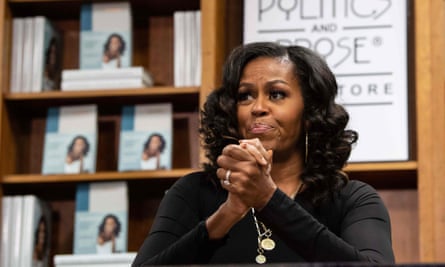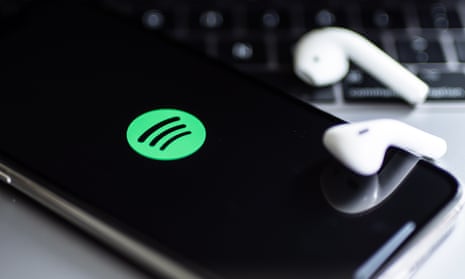Spotify recorded a doubling in podcast listening hours in the fourth quarter of 2020, as locked-down listeners hunting for entertainment tuned in to Michelle Obama and the Duke and Duchess of Sussex, driving a Wall Street-beating 24% year-on-year increase in paying subscribers.
The audio streaming company, which now has 155 million paying customers, saw its total monthly user base, including those on its free, advertising-supported tier, grow 27% year-on-year to 345 million.
A quarter of all users engaged with podcast content in the final three months of 2020 in what Spotify sees as validation of its decision to spend millions on a roster of new talent in a strategic shift beyond music.
“We are confident that podcast usage has been a factor in the accelerated net additions,” said Daniel Ek, founder and chief executive of Spotify, in a letter to shareholders. “We have increasing conviction in the causal relationship between growth in podcast consumption driving higher [value] and retention among our user base.”
The number of podcasts offered has more than tripled in a year, from 700,000 in the final quarter of 2019 to 2.2m at the end of 2020, with deals now in place with a huge range of presenters.
In December, Spotify announced a multi-year partnership with the Sussex’s company, Archewell Audio. The company said it was “pleased” with the performance of its holiday special, released in December, and is looking forward to a “full-scale launch of shows coming in 2021”. Obama’s interviews with family and friends have been pulling in listeners, while the Joe Rogan Experience, which has controversially featured the conspiracy theorist Alex Jones, is Spotify’s No 1 podcast in 17 territories since becoming exclusive late last year.

Spotify’s podcasting strategy helped it outperform expectations of advertising income, which grew 29% year-on-year to €281m, as advertiser demand continues to bounce back after contracting at the start of the pandemic.
Ad revenues related to its podcasts grew by more than 100% year-on-year, with a 50% increase in the number of advertisers compared with the third quarter. Advertising now contributes a meaningful share of total revenues, accounting for 13% in the fourth quarter.
The main driver of the business continues to be subscriptions, up 15% year-on-year to 1.89bn. Total revenues grew 17% year-on-year to €2.17bn.
Despite attracting a record 31 million new paying subscribers last year, Spotify’s share price fell 8% as the market reacted to lower-than-expected forecasts for growth in 2021.
Spotify expects to reach as many as 427 million monthly active users and 184 million paid subscribers this year.
It ventured into podcasting in 2019, spending hundreds of millions acquiring companies in the sector and striking talent deals, to reduce its dependence on music in the face of rising competition from rival services including Apple and Amazon Music.
